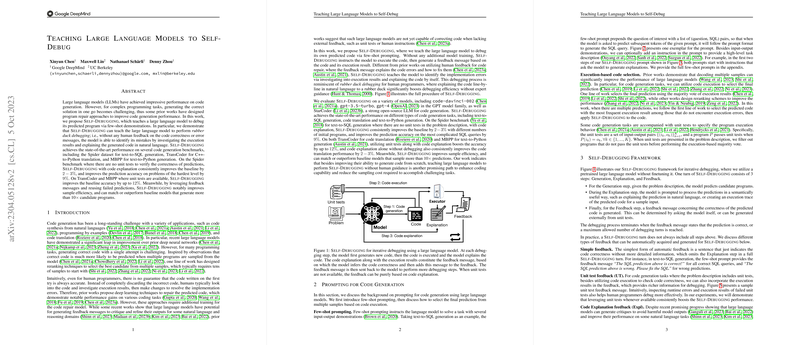Overview of ELF-DEBUGGING for LLMs
The paper "Teaching LLMs to Self-Debug" introduces a novel approach, ELF-DEBUGGING, aimed at enhancing the debugging capabilities of LLMs. Tackling the challenge of generating correct code consistently, the authors propose a method that empowers LLMs to self-debug, inspired by the human technique of rubber duck debugging. This involves the LLM explaining its code line-by-line without explicit human feedback, using execution results to identify and correct errors.
Key Results and Contributions
ELF-DEBUGGING was evaluated across several benchmarks, achieving state-of-the-art accuracy enhancements:
- Spider Benchmark: For text-to-SQL tasks with no unit tests, ELF-DEBUGGING improved baseline accuracy by 2-3% and offered a 9% boost for the most challenging queries.
- TransCoder and MBPP: These tasks, which involve code translation and text-to-Python generation, saw accuracy gains up to 12% with unit tests. Notably, the debugging without explanations still consistently improved performance by 2-3%.
The model demonstrated improved sample efficiency, matching or surpassing baseline models with significantly fewer predictions, highlighting the potential for reducing computational resources.
Methodological Insights
ELF-DEBUGGING capitalizes on the intrinsic code generation abilities of pre-trained LLMs:
- Few-Shot Prompting: This technique requires minimal input demonstrations, streamlining the model's task adaptation without extensive retraining.
- Rubber Duck Debugging Analog: By simulating a step-by-step explanation process, models can internally critique and refine generated code.
Practical and Theoretical Implications
Practically, integrating ELF-DEBUGGING could significantly enhance the robustness of code generated by LLMs in software development, reducing reliance on human oversight and potentially lowering debugging costs in production pipelines. Theoretically, this approach paves a promising path for autonomous AI systems capable of self-improvement and error detection.
Speculation on Future Developments
Considering future advancements, this research suggests refining LLMs' semantic comprehension, potentially incorporating more sophisticated diagnostic tools and enriched feedback mechanisms. Further exploration could involve hybrid approaches melding predictive models with real-time execution feedback to bolster debugging efficacy.
In conclusion, ELF-DEBUGGING represents a meaningful stride towards autonomous self-correcting AI systems, expanding the horizons of AI applications in software engineering. By evidencing tangible improvements in efficiency and accuracy, this work suggests a transformative trajectory for enhancing LLM utility in complex code generation tasks.
